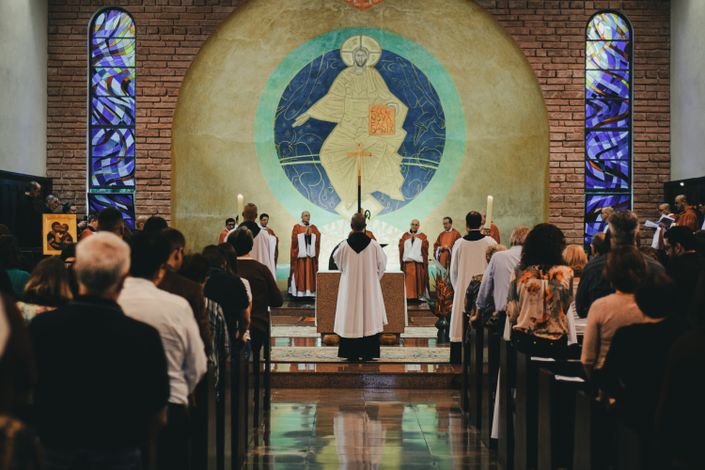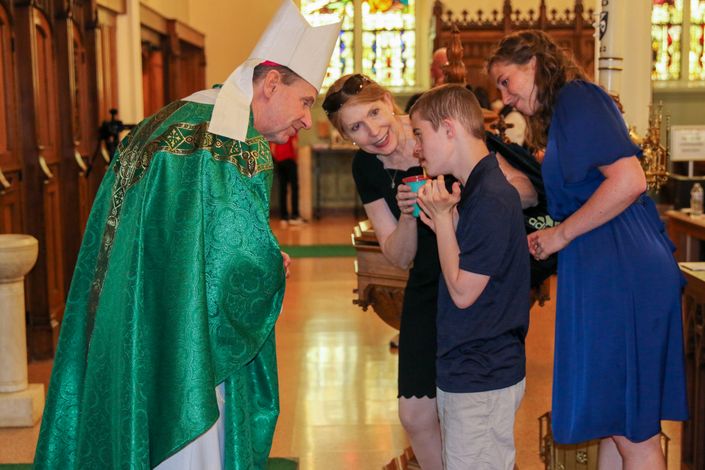
Presenter -
Noelle Collis-DeVito
English Curriculum Research Assistant and Coordinator for Programs with Persons with Disabilities for the Institute for Pastoral Initiatives at the University of Dayton
Noelle Collis-DeVito and her family reside in Centerville, OH. She previously served as the Associate Director for the Office for Persons with Disabilities of the Archdiocese of Cincinnati, where she worked to create a culture of inclusion and meaningful participation for persons with disabilities and their families. In her time working for the Archdiocese of Cincinnati, Noelle spearheaded the development of the new Office for Persons with Disabilities, worked to institute Sensory-Friendly Liturgies as a regular part of parish life, and collaborated with parishes and other Archdiocesan Offices to establish a sense of belonging for all. Noelle recently completed her Master's in Pastoral Ministry from the University of Dayton with a Certificate in Disability and Ministry. She also presents and writes on the topics of Sensory-Friendly Mass, Adaptive Catechetical Learning Plans, and Multi-Sensory Learning for Diverse Classrooms.
The Benefits of a Sensory Friendly Mass
This type of Mass takes into consideration the sensory sensitivities and challenges faced by persons with disabilities, such as autism, sensory processing disorders, or other conditions. The environment is carefully designed to reduce sensory overload, with considerations for lighting, sound, and other potential triggers that might be overwhelming for some individuals. Additionally, the service may include visual aids, simplified language, and extended time for responses to allow everyone to fully engage in the worship experience.
This tailored approach to the Mass brings numerous benefits to persons with disabilities, their families, and the Catholic parish hosting the service. Firstly, it creates a welcoming and accepting space where individuals with disabilities can fully participate in the religious community. This fosters a sense of belonging, promoting spiritual growth and emotional well-being among those who may have felt excluded from traditional Mass settings due to their unique needs. The Sensory-friendly Mass also allows families of persons with disabilities to worship together without the worry of potential disruptions, creating a more profound sense of unity and support within the parish.
Example Curriculum
- What is a Sensory Friendly Mass? (4:22)
- Choosing the Mass (2:20)
- Selecting Liturgical Ministers (2:13)
- Liturgical Minster Roles (2:56)
- Preparing the Space (2:58)
- Liturgical Considerations (6:06)
- Smells and Bells (1:32)
- Liturgy Checklist (3:58)
- Questions and Answers (8:20)
- In a School System (2:42)
- Summary (1:33)
- Introduction (2:15)
- Video on First Communion and Confirmation (6:44)
- Importance of Awareness (1:17)
- Parish-Wide Awareness (2:01)
- Bulletin Inserts (1:27)
- Printable Materials (2:22)
- Bulletin and Pulpit Announcements (3:25)
- Address During the Homily (2:03)
- Sharing Stories (3:03)
- Host an Awareness Session (1:22)
- Parish Website and Social Media (2:28)
- Local Press (1:20)
- Organizational Outreach (1:47)
- Comments and Questions (7:43)
- Overview (0:50)
- Inclusion vs Belonging (6:02)
- Etiquette & Hospitality: Physical Mobility (2:54)
- Etiquette & Hospitality: Blindness and Low Vision (1:45)
- Etiquette & Hospitality: Deaf Hard of Hearing (3:06)
- Etiquette & Hospitality: Speech Disabilities (0:23)
- Etiquette & Hospitality: Intellectual and Developmental Disabilities (0:36)
- Etiquette & Hospitality:Behavioral Needs (2:01)
- Etiquette & Hospitality: Mental Health and Other Tips (1:01)
- Accommodations and Alternative Spaces (7:21)
- Resource List - Free (4:42)
- Resource List - Paid (5:38)
- Comments and Questions (6:36)
- Mass_Tool_Kit_SFM_Resource_Links-_NCPD
- Parish_Awareness_SFM_Links-_NCPD_6
- Step 1- Awareness Advertising Notes
- Awareness__Advertising-_NCPD_b
- Creating_a_Welcoming_Environment-_NCPD_b_0
- Etiquette-and-Hospitality-Tips-OPD-1.2023
- Homily-Helps-LENT-SFM2.2023
- In_Person_Workshop_Introduction
- In Person Workshop Step 1
- In_Person_Workshop_Step_2
- In Person Workshop Step 3
- Liturgical_Minister_Training_Notes-_NCPD
- Sensory-Friendly_Mass_Checklist-_NCPD_Cmprs
- Sensory-Friendly_Mass_Liturgy_Planning_Form-_NCPD
- Sensory-Friendly_Planning_Timeline-_NCPD_Cmprs
- Session_One_-_Planning_the_Liturgy-_NCPD_Reduced
- Step_3-_Accommodation_Notes-_NCPD
- Banner Sensory Friendly Mass add Church Name
- Header Sensory Friendly - Space for Diocese Name and Ministry
- Header Sensory Friendly
- Logo Sample SFM Blank
- Logo Sample with Church name
- Sensory Friendly Header Space for Church Name
- Social Media Space for Church name
- Prayer of Saint Francis for Autism
- Guidelines-for-the-Celebration-of-the-Sacraments-with-Persons-with-Disabilities-Revised-Edition
Example Featured Products
Showcase other available courses, bundles, and coaching products you’re selling with the Featured Products block to provide alternatives to visitors who may not be interested in this specific product.





